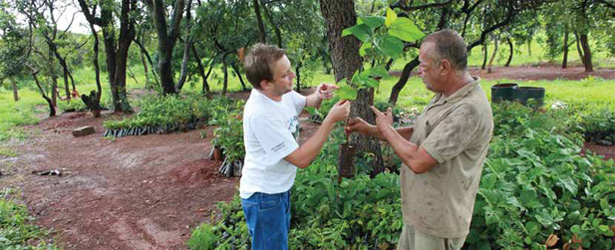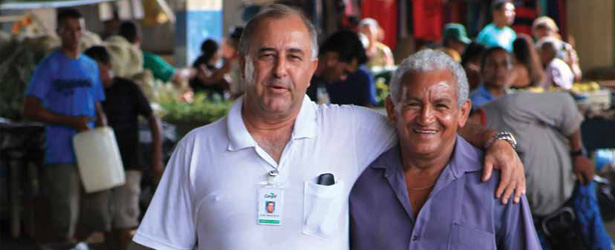Environmental Standards


Cargill continually invests in the sustainability of its business, which includes employee awareness, adoption of technologies and practices for clean, efficient production, and product development to minimize waste. The Environmental Committee is part of the company’s structure and is responsible for disseminating and promoting environmental initiatives and integrating Business Units around this topic. In 2009, members around Brazil came together by means of conference calls and the Committee created a single indicator to make comparison of units’ environmental performance, which is to be implemented in the next fiscal year. A control spreadsheet for solid waste was defined and introduced, as a tool for conducting the company’s Solid Waste Management Plan, and it was established that corporate auditing would begin to take environmental aspects into account. It also organized technical visits and the exchange of information about environmental projects between the units of Mairinque, Uberlândia, Barreiras, and Ilhéus, and transformed Environment Week into an awareness-raising event, with training sessions and lectures.
Another highlight of the year was the launch of Ingeo™, a biodegradable plastic that degrades within five months when submitted to industrial composting.
The End to End project developed with Walmart was also put into effect to measure and minimize environmental impacts in the production of Liza brand oil (more details on next page).
Other fronts of Cargill’s work in the environmental area are as follows:
Clean Energy – The company invests in generating its own energy with the adoption of renewable resources (biomass). Currently, 62% of Cargill’s energy matrix is from biomass. In the new unit of Primavera do Leste (state of Mato Grosso), approximately 70% of the energy demand is generated by burning wood and non-fossil fuel in a high-pressure boiler for steam production. In Uberlândia, where the company’s second largest industrial complex in the world is located, R$ 85 million was invested in a boiler that will, beginning in 2010, generate clean energy produced from biomass, primarily sourced by wood chips from purpose-grown forests. With this investment, the company will be able to obtain internally 70% of all its energy used in the industrial complex.
A new boiler is being installed at Cevasa in order to increase generation using biomass. The current equipment has an installed capacity of 12 MW. The system’s energy efficiency will be increased with the installation of the new back-pressure turbine of 32 MW. After the mill is expanded and the plant is connected to the public network, it will be possible to sell surplus energy. This measure will result in decreased demand for energy production by fossil fuel-powered thermoelectric plants in the state of São Paulo. Annual emission of approximately 24,000 metric tons of CO2 is expected to be avoided. In the Ilhéus (state of Bahia) factory, straw, coconut and cocoa are used as biomass.
Forests – Cargill maintains its projects of eucalyptus plantation for biomass in order to fuel steam-generating boilers and thus reduce the use of fossil fuels by adopting renewable energy sources, cutting down greenhouse gas emissions. Thus, there is great synergy in actions of the factories in relation to forest areas in order to estimate demands and ways to meet them. The young tree growth process contributes to a carbon sink, reducing levels of greenhouse gases in the atmosphere. In the period since reforestation activities began in 2004, until the conclusion of the second cycle of planting, the company will have invested US$ 115 million in this activity.
As a result of Cargill’s partnership with The Nature Conservancy, suppliers in the region of Santarém are encouraged to comply with the Brazilian Forest Code, through actions to raise awareness about the sustainable production of soybeans and incentives to comply with the Rural Environmental Register (CAR) of the Environment Department of the state of Pará.
Water Consumption Awareness – In Cevasa, water consumption will undergo sharp reductions due to adoption of new technologies. The cleaning of the product has become a dry process due to the fact that sugar cane harvesting has been mechanized by many of the suppliers. In addition, Cargill has introduced improvements to use closed water circuits for some stages of the process. Thus, consumption should fall from 1.82 m³/t of sugar cane to only 0.39 m³/t. Another action adopted at the Paranaguá Terminal Unit (state of Paraná) was the creation of a project to reuse rainwater for washing equipment and internal and external areas of the subsidiary, reducing water consumption. This measure has already resulted in the fall of monthly water consumption from 400 m3 to 235 m3.
Carbon footprint – A carbon footprint was measured at Cevasa this year for ethanol production. The practice involves measurement of emissions throughout the product’s entire life cycle, i.e. from raw material production and distribution to its final disposal. For this calculation, the method suggested by the California Air Resources Board (CARB) was used, and an emission of 10.4 grams was detected for every megajoule of ethanol, 89% less than gasoline.
Celebration – In order to celebrate inclusion for the ninth consecutive year among the 150 best companies to work for in Brazil, Cargill dispatched employees from the São Paulo, Mairinque, Uberlândia, Cosmópolis, São José do Rio Pardo, and Guarujá units to the unit at Porto Ferreira where they planted 3,800 native tree seedlings in partnership with the Luiz de Queiroz Agricultural University (ESALQ/USP). The professionals also attended a workshop on manufacturing solar heaters using cheap and readily available materials. A company was contracted to maintain the area planted for a period of two years. Cargill Foundation contributed with technical consulting and the event gave impetus to the company’s environmental commitment.
WalMart Partnership – In the first half of 2009, Cargill signed a pact for the sustainability of its client WalMart, through which it committed to build the chain of the future. The initiative sets global targets to reduce waste, reduce emissions of greenhouse gases, promote sustainable products, and make better use of water and energy resources. Prior to this, it had been invited by the chain to participate in the End to End Project (Sustainability Across Boundaries), which aims to encourage companies to continually seek more sustainable solutions. With this in mind, Cargill mapped the production process of the Liza line of oils and adopted a series of measures to reduce environmental impacts of operations, such as reduction of 10% of PET bottle weight, thus reducing electrical energy consumption and solid wastes by improvements to raw material transportation.
Topchim Partnership – Together with Brazilian company Topchim, Cargill developed TopScreen DS13. It is made of a plant-based raw material and, when applied to paper surfaces, provides a protective waterproof coating.
Sustainable Shipping – In response to an order from a European customer, the Sugar & Alcohol Unit made sustainable shipments of sugar to Europe from the Santos port. To this end, the process underwent auditing by the client itself, including an evaluation of the sugarcane production conditions, transportation and arrival at the port where the product was shipped in a segregated manner, ensuring its origin and compliance with the stipulated economic, social and environmental standards.
BSI – Cargill also is part of the Better Sugar Cane Initiative Limited (BSI). Its goal is to ensure that current and future sugar cane plantations observe sustainable practices. The companies that make up BSI work on establishing economic, environmental, and social criteria in order to assess how the entire sugar and alcohol chain is conducted and to implement a certification system that evidences best practices. The first draft of these indicators was completed in 2008 and released for public consideration. Based on the preliminary criteria, Cevasa was audited by the Cert-ID company, considering the resolutions adopted up to that point by BSI without any detection of significant non-compliance.
Wastewater Treatment – The Primavera do Leste unit has a wastewater treatment system in which wastewater is used entirely for fertigation (irrigation in internal areas of eucalyptus plantation and gardening). Moreover, there is a process of particle retention by multiclones and final washing of the boiler gases in order to ensure that the levels of carbon monoxide and dioxide emitted are in accordance with the specifications of environmental agencies.
Since the company started its reforestation activities until the end of the second planting cycle, US$ 115 million will have been invested in the activity.
In Uberlândia (state of Minas Gerais), composting treats 100% of the waste from the three factories that make up the industrial complex. The organic compost which results from this production is registered in the Ministry of Agriculture under the name Plantil. This product is used as a substrate for plants in projects for recovering degraded areas and for Cargill’s reforestation efforts.
World Earth Day – For another year, Cargill celebrated this date (April 22) in its plants, with activities such as visits to schools to encourage waste recycling and water conservation.
Environment Week – The program for Environment Week, held in June, includes recycling, educational lectures on preservation and sustainability of natural resources, contests, giveaways, and more.
Environmental Impact Study – Environmental Impact Report, Completed in September 2008, the Environmental Impact Study (EIA) of the Solid Bulk River Terminal located at the Port of Santarém (state of Pará) was delivered to the Environmental Department of the state of Pará. After analysis, the Environmental Department requested supplemental information to some parts of the study, which has already been carried out by the specialized external consultant in charge. Once approved, the Environmental Department will convene public hearings to present the project to communities. The slowdown on this process is causing operational difficulties for Cargill and delaying the potential for economic gains for the region. The study considered all the direct and indirect impacts from the building and operation of the Terminal and indicated the measures required to alleviate effects detected by the specialized technical team.





